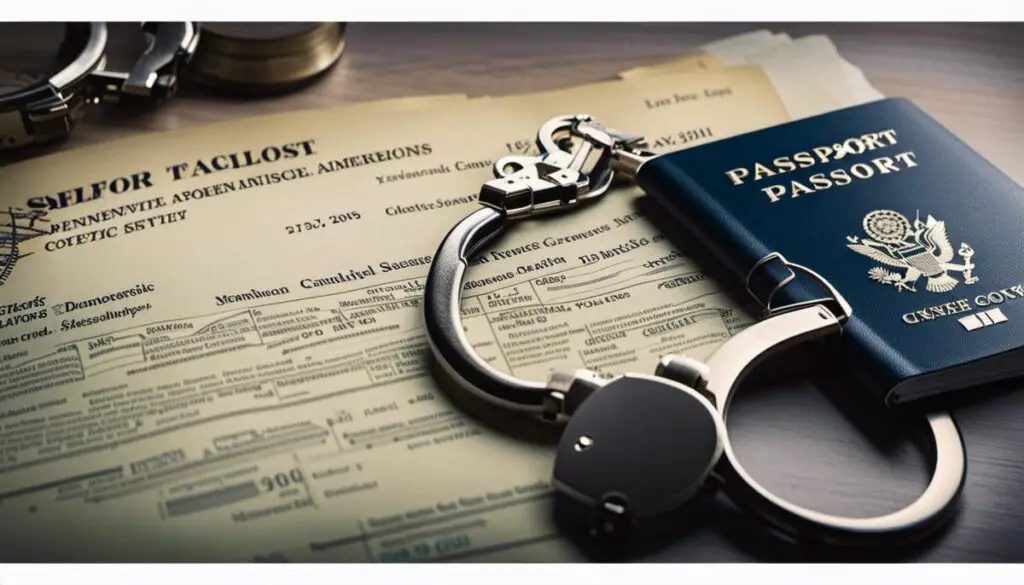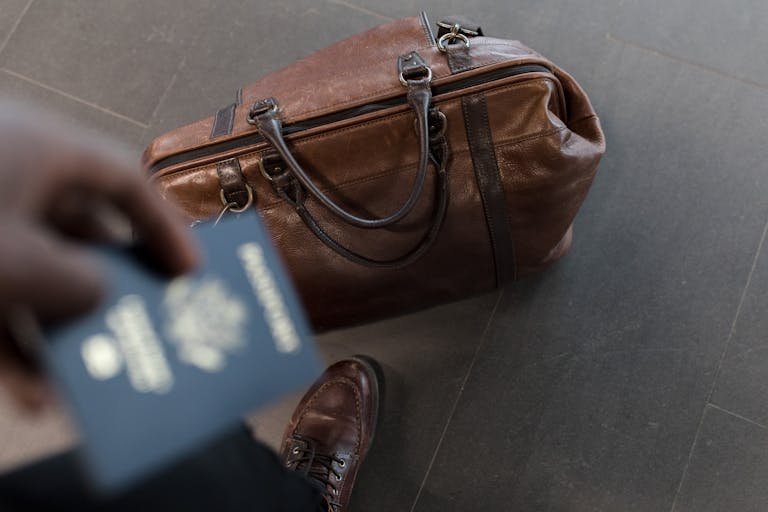WHAT COUNTRIES CAN YOU VISIT WITH A CRIMINAL RECORD
Navigating the landscape of travel restrictions can be a daunting task for anyone, let alone someone carrying the weight of a criminal record.
A few countries may permit entry to individuals who have been acquitted of a crime, but regulations can vary significantly. The goal of this post is to demystify the complications surrounding the rules and regulations imposed on convicted felons wishing to travel and to provide a comprehensive guide to domestic and international travel possibilities for this demographic.
Throughout this post, we will delve into the rationale behind these restrictions, dissect the travel limitations within the United States, explore international opportunities, discuss the passport process, and share successful travel stories from individuals managing the challenge posed by their criminal records.
Understanding Restrictions for Those with a Criminal Record
In various countries across the globe, individuals with criminal records face certain travel restrictions. These limitations exist due to an array of legal measures and safety precautions taken by nations to protect their citizens and maintain order.
The purpose of these travel restrictions typically revolves around national security, safety, and public order. National governments have the right and responsibility to determine who can enter and remain within their borders. Therefore, factors like a person’s criminal record may drastically influence these decisions.
Certain countries possess strict policies regarding felon travel, primarily rooted in international and national law. However, the specifics of these restrictions often depend on a variety of factors, including the severity of the crime, whether it is considered a serious crime, time since the conviction, and the individual’s behavior since their conviction.
These limitations vary from nation to nation and are enforced at the discretion of each country’s immigration officers.
How Do Travel Restrictions Work?
Travel restrictions for convicted felons largely depend on the country they wish to visit. Various nations have specific laws and regulations pertaining to felons and their ability to cross borders. These rules hinge on the nature of the crimes committed, the punishment received, including if it resulted in a prison sentence, and how long ago the felon completed their sentence.
For example, countries with particularly stringent immigration laws, like the United States and Canada, may deny entry to individuals with certain types of criminal convictions. However, other countries like Mexico and the Caribbean nations may be less strict, allowing convicted felons entry provided they’ve completed their sentence and comply with other immigration regulations.
In numerous cases, felons are required to apply for a visa to gain entry into a foreign country. The visa application process often includes questions regarding the applicant’s criminal history. A conviction doesn’t necessarily lead to automatic disqualification, but it could complicate the process and possibly result in denial.
Traveling with a Felony: Where Can Convicted Felons Travel To?
The world is not completely closed off to those with criminal records. However, convicted felons in particular, need to comprehend and comply with the distinct immigration rules and regulations of each country. Regions such as Southeast Asia, Central and South America, Africa, and the Middle East typically have less stringent travel restrictions for felons.
Although the United States and Canada may impose restrictions on felons, Mexico and other nations such as Colombia, Ecuador, Peru, and Costa Rica have more lenient laws. Southeast Asian regions like Thailand, Cambodia, and the Philippines also generally permit travel for those with criminal records.
When applying for a tourist visa, individuals with a criminal record may face additional scrutiny and must disclose their criminal history, which can complicate the process.
However, European travel throws up more hurdles. In the Schengen Area, which comprises 26 European countries, U.S. citizens usually can roam visa-free for up to 90 days. Yet, a criminal record might obstruct this privilege. Thus, it is crucial for felons to review the specific rules for each country in the Schengen Area.
While it can be a daunting task to decipher these diverse restrictions, appropriate research and strategic planning can open up several opportunities for convicted felons wishing to venture abroad. Because policies can fluctuate, it is crucial to stay updated with the current laws and requirements of each country when planning travel.

Traveling Within the United States
Charting The Homeland: U.S. Domestic Travel Guidelines for Convicted Felons
Unlike international restrictions, there’s no explicit prohibition in the United States limiting domestic travel for convicted felons. There are few overt hindrances, but certain laws and regulations associated with an individual’s parole or probation terms can restrict their freedom to move.
Often, these conditions specify that felons must stay within a particular location, usually their home county or state, unless authorized by their parole or probation officer to journey elsewhere.
Moreover, each state maintains distinct laws on whether felons are granted restoration of rights, like voting or weapon possession. Consequently, relocating or journeying to a different state does not automatically alter a felon’s legal status.
Unexpected legal complications could arise if they breach specific laws tied to their conviction in the state they are visiting.
Understanding State-to-State Variation in Laws
The United States has a federal system of government where power is divided between the federal government and state governments. This means that criminal laws can vary significantly from state to state.
While some crimes, such as major drug offenses, are illegal everywhere in the U.S., other legal areas, such as gun laws, drastically differ depending on the state. It’s essential for felons to thoroughly understand these varying laws between states.
For example, in states like Arizona and Florida, felons’ rights, including the right to vote and the right to own guns, are restored after a specific duration post-incarceration. At the same time, other states like Iowa or Alabama impose more stringent rules on when and how a convict may regain these rights.
International Travel: Restrictions and Opportunities for Convicted Felons
When it comes to international travel, it directly depends on the regulations of the specific country a convicted felon is planning to visit. Some countries, like Canada, are known to have stringent regulations in place that may prevent felons from entry. However, countries such as Mexico or Europe’s Schengen area do not have any specific regulations barring entry to felons.
Most countries conduct a background check at the time of visa application or on arrival. The decision to allow entrance is mostly at the discretion of border control officials.
The type of crime committed too affects the decision: violent crimes, drug-related offenses, and crimes involving children can lead to denial more frequently. Convicted felons are encouraged to conduct specific research into their desired destination’s entry requirements, or via the U.S. Department of State’s website, before making travel plans.
When applying for visas, all convictions, including spent convictions, must be disclosed, especially for countries like New Zealand and the United States, where failing to declare spent convictions can lead to being barred from entry or facing significant delays during the visa application process.
Understanding Passport Eligibility for Convicted Felons
All U.S. citizens, felons included, generally have the right to apply for and receive a U.S. passport. There are, however, certain exceptions to this rule.
For instance, felons who have been convicted of international drug trafficking or owe child support debts that exceed $2,500 may encounter barriers in obtaining a passport.
It’s also important to note that possessing a U.S. passport does not automatically grant entry to other countries. Each country enforces its own set of immigration laws and entry regulations, which felons must comply with.
International Travel for Convicted Felons
Navigating International Travel as a Convicted Felon: A Broad Overview
Policies on admitting visitors with a criminal history vary from one country to another. A significant number of countries do not impose any regulations that specifically deny entry to convicted felons.
Conversely, there are countries that implement stringent immigration policies and may refuse entry to individuals based on the nature of their criminal convictions.
Entering Canada with a Criminal Record
Canada is one country that imposes strict regulations on travelers with a criminal record. Even minor offenses can result in an individual being denied entry.
For a felon to be considered “rehabilitated,” a certain period must have passed since the completion of the imprisonment sentence. Depending on the crime, this period can be either 5 or 10 years. In some cases, an individual might apply for criminal rehabilitation to gain entry, which constitutes a lengthy and complicated process. Even then, approval is not guaranteed.
Similarly, New Zealand has stringent entry requirements for travelers with criminal records. Understanding the ‘good character’ assessment conducted by immigration authorities is crucial, as individuals with serious character issues may face significant challenges and restrictions when applying for visas or travel authorizations like the NZeTA.
European Union’s Policy on Convicted Felons
The European Union typically does not restrict travel for individuals with a criminal record as long as they have the necessary documentation. This includes convicted felons from the United States.
To travel to the Schengen Area, Americans generally only need a valid passport for at least three months beyond the intended stay. However, starting in 2022, American travelers must apply for an ETIAS visa waiver to enter Schengen Area countries.
Australia’s Entry Requirements
Australia also has stringent entry requirements for travelers with a criminal record. The country may refuse visa applications or can deny entry upon arrival if a person has a substantial criminal record.
This is generally defined as a sentence of 12 months or more in prison, multiple sentences that aggregate to more than 2 years, or a sentence for an offense that involves immigration detention, idleness, or escaping from detention.
Countries with Relaxed Entry Requirements
Some countries, like Mexico, the Caribbean, and most Central and South American countries, often do not have strict restrictions for tourists with a criminal background, unless the crime was committed within their borders or was drug- or terrorism-related. Similarly, many African and Asian countries do not have strict entrance policies for individuals with criminal records.
Traveling to the Middle East with a Criminal Record
Traveling to the Middle East with a criminal record can be a complex endeavor due to the region’s stringent laws and regulations. Many countries in the Middle East, such as the United Arab Emirates (UAE), have strict entry requirements for individuals with a criminal history. However, entry is not entirely out of reach.
For instance, the UAE may allow individuals with a criminal record to enter, provided the crime was not committed within the UAE and the individual has fully served their sentence.
If you’re planning a trip to the Middle East, it’s crucial to thoroughly research the specific laws and regulations of your destination country. You may need to obtain a visa or provide documentation of your criminal record, and in some cases, you might face denied entry.
It’s also important to be aware that certain types of crimes, particularly drug offenses, are taken very seriously in this region. A conviction for a drug-related crime could result in being refused entry to certain Middle Eastern countries.
Deportation and Denied Entry Due to Criminal Records
Certain countries, like the United States, have significantly stringent immigration laws. They may deport non-citizens, including green card holders, if they commit certain crimes, irrespective of their sentence length. Knowing the immigration and visa policies of a country before planning a trip is undoubtedly crucial in these circumstances.
The Big Picture
Navigating international travel as a convicted felon can often seem like a daunting challenge. It’s a process that commands comprehensive research, planning, and often, legal guidance. An understanding of specific travel restrictions for different countries and the kind of documentation required is crucial. It’s also important to remember, dishonesty or misinformation on visa applications can lead to serious legal repercussions.
The Process of Obtaining a Passport
Applying for a Passport: Convicted Felons
Contrary to popular belief, the process to apply for a passport for convicted felons in the United States isn’t very different from that of other citizens. It involves completing the DS-11 form, presenting proof of U.S. citizenship, an identification card, and a recent passport photo. Nonetheless, felons should be prepared to face some additional scrutiny during the review stage of their application.

Eligibility Restrictions Due to Criminal Convictions
Felons must understand that certain crimes may automatically disqualify them from obtaining a passport. These include international drug trafficking offenses or owing more than $5,000 in child support payments. Clause 22 U.S.C. 2714 also considers individuals convicted of a felony involving crossing international borders ineligible for a passport.
On the other hand, other lesser offenses might not necessarily restrict eligibility. It largely depends on the specific circumstances surrounding the criminal conviction and whether or not a court order specifically forbids international travel.
Improving Chances of Successful Application
For felons, there are ways to potentially improve their chances of obtaining a passport. The most effective way is to apply for the passport once off probation or parole, as these circumstances themselves might restrict international travel.
Moreover, demonstrating good behavior post-conviction, keeping a clean record, and showing evidence of rehabilitation might help. However, note that the final judgment solely rests upon the discretion of the passport authority.
Understanding International Travel as a Convicted Felon
Exploring the globe as a convicted felon can hinge upon specific immigration laws unique to each country. For instance, traveling to Canada may present challenges as they often deny entry to individuals with certain offenses, including DUIs.
Conversely, more accommodating nations such as Mexico, Costa Rica, and Ecuador are relatively lenient towards those with prior criminal records. However, it’s noteworthy that some countries utilize the Interpol database for screening travelers’ criminal backgrounds which might include yours.
Regardless, felons must familiarize themselves with the specific entry policies of the prospective destination before committing to travel plans. One way to do this is by reaching out to local embassies or reviewing the travel advisories put forth by the U.S. Department of State.
It’s crucial to remember that even with a passport, entry into foreign territories is not guaranteed. Ultimately, it’s the immigration authorities of the host country who conduct a background check upon arrival and decide whether to grant or deny entry.
Managing Multiple Criminal Convictions
Having multiple criminal convictions can significantly complicate international travel plans. However, there are strategies to manage your convictions and improve your chances of being allowed entry into a foreign country.
One effective approach is to provide detailed documentation of your criminal convictions. This should include the nature of the crimes, the sentences received, and any rehabilitation programs completed. Such transparency can help demonstrate to immigration officials that you no longer pose a risk to their country.
Another valuable strategy is to seek the advice of a lawyer or immigration expert. These professionals can help you navigate the intricate laws and regulations surrounding criminal convictions and international travel. They can provide insights into the specific requirements of your destination country and ensure that you have all the necessary documentation to support your case.
Strategies for Handling Multiple Convictions When Traveling
If you have multiple criminal convictions, preparation is key to successful international travel. Here are some strategies to help you manage your convictions:
- Be Honest: When applying for a visa or entering a foreign country, always be honest about your criminal convictions. Providing false information can lead to serious consequences, including being denied entry or even facing arrest.
- Provide Documentation: Detailed documentation of your convictions can help demonstrate to immigration officials that you are not a risk. This includes court records, proof of rehabilitation, and any other relevant documents.
- Seek Advice: Consult with a lawyer or immigration expert who can help you understand the complex laws and regulations surrounding criminal convictions and international travel.
- Research the Country’s Laws: Thoroughly research the specific laws and regulations of the country you plan to visit. Understanding what types of convictions are considered serious crimes in that country can help you better prepare for your trip.
Maintaining a Clean Criminal Record
Maintaining a clean criminal record is essential for future travel opportunities. Here are some reasons why:
- Easier Travel: A clean criminal record simplifies international travel, as you won’t have to worry about being denied entry or providing extensive documentation of past convictions.
- Increased Opportunities: A clean record can open doors to various opportunities, including education, employment, and other areas of life.
- Peace of Mind: Knowing that you have a clean criminal record can provide peace of mind and reduce stress when planning to travel abroad.
Importance of a Clean Record for Future Travel Opportunities
Having a clean criminal record is crucial for future travel opportunities. Here are some key reasons:
- Visa-Free Travel: Many countries offer visa-free travel to individuals with a clean criminal record, making it easier to travel abroad without the hassle of applying for a visa.
- Reduced Risk of Denied Entry: A clean criminal record significantly reduces the risk of being denied entry to a foreign country.
- Increased Opportunities: Beyond travel, a clean criminal record can enhance your prospects in education, employment, and other life areas, providing a broader range of opportunities.
By understanding the importance of maintaining a clean record and the strategies for managing past convictions, individuals with a criminal history can better navigate the complexities of international travel and open up new possibilities for their future.
Some Successful Travel Stories of Convicted Felons
Personal Account: Overcoming Barriers to International Travel Post-Conviction
Inspiring tales from past felony offenders illustrate that global travel is not an impossibility. One such instance is Carlos, a former drug dealer who turned his life around to become a motivational speaker. Post incarceration, he was driven by a strong urge to travel to South America, specifically targeting Brazil and Argentina.
To his surprise, he found both Brazil and Argentina to have welcoming approaches towards travelers with a criminal past. He credits his successful journey to the diligent fulfillment of all visa prerequisites and advocating honesty during immigration questioning. Carlos’s experience shines as a guiding light for other ex-convicts inspired to tread the travel path.
Asia: An Accessible Destination
Tim, who once served time for financial fraud, now thrives as an entrepreneur. His global business demands frequent travel, especially to Asian countries. With thorough research and careful planning, Tim learned that countries like Japan and Thailand do not outrightly prohibit travelers with a criminal record. It’s important to remember, however, that strict visa procedures and rigorous immigration checks are still in place. Convicted felons are encouraged to ascertain the immigration rules of their desired destination before traveling.
Expungement and Canada: A Fresh Start
The case of Linda is particularly enlightening. Despite having a felony conviction for embezzlement, Linda was able to travel to Canada, a country known for its stringent immigration laws concerning convicted felons. This was made possible through the expungement of her criminal record, allowing her to visit Canada without restrictions. This is a great reminder for felons to consider the legal resources available to them, including expungement and pardons, depending on the jurisdiction, to ease their travel.
Traveling to Europe: Awareness and Preparation
Mike’s story provides hope for convicted felons wishing to travel to Europe. Mike was convicted on assault charges, but his dream was to travel to Italy and France after serving his time. He found out that the European nations under the Schengen agreement, including Italy and France, have no explicit rules against admitting tourists with criminal records. However, Mike emphasizes the importance of honesty and awareness – travelers must be prepared to declare any past convictions if asked at the border control.
These stories represent just a few examples of convicted felons making successful trips abroad.
The common thread in every story is the need for diligent preparation, thorough research, honesty, and patience. Remember, each country has its individual immigration rules and regulations.
Consulting with a legal expert before planning a trip can help avoid potential disappointments and legal infringes, ensuring a smooth and enjoyable travel experience.
Overcoming travel restrictions as a convicted felon undoubtedly presents a significant challenge. However, it’s crucial to remember that the path towards exploration isn’t entirely blocked.
Understanding the rules, both domestic and international, coupled with patience and perseverance, can pave the way toward expanding one’s horizons. The takeaways and stories shared throughout this discussion are a testament to the possibilities that lie ahead. It’s a journey of knowledge, hope, and resilience.






Wrong. If you committed any crime causing you to go to jail, Japan does not allow entry.